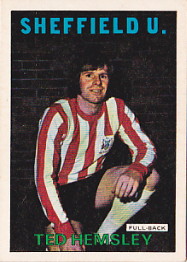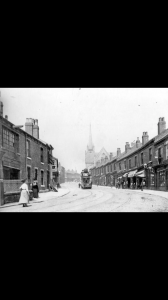My grandma (dad's mum) lived at Victor Street, S6. This was actually posh as they'd moved from a decrepit slum on Albert Terrace Road (where the apartments are on the corner of Penistone Road) in about 1935. I used to love going as it had an outside bog and the plumbing consisted of one cold tap in the sink and a kettle. Quirky! My dad told a great tale about why they had no light in the kitchen. When they had electricity installed in about 1936, the company gave a basic number for nowt - any more you had to pay for. My grandad said they'd have the basics and have more installed when they had the cash. They had a light in the "front room" (used about every 3 years and at Christmas), but intriguingly not in the kitchen (a room that my grandad didn't venture into except as a means of getting into and out of the house!). My grandma moved in about 1966, and still without no kitchen light. She had cooked meals for 30 years, between November and March, essentially in the dark, with a torch or candle! She had a hard life, but she was great, and rightly or wrongly, "just got on with it"!
Great story that! Reminds me of my dad. The house was a wedding present from my grandad. I was told he paid £100 for it and bought the one next door for him and my grandma. Identical pair of mid terraces. That must have been in the 1930’s.
First thing my dad did was have the gas ripped out. He thought gas was dangerous. So mother cooked for years using only the Yorkshire range and open fire, or a small prmus stove (Remus brand) with a single burner that ran on paraffin and meths.
The only source of hot water was the boiler - part of the Yorkshire range. The hot water in there was not much good for owt as it got soot falling in it from the chimney. On bath nights we’d boil up water on the open fire in a big bucket and fetch the tin bath in that hung on a nail on the outside wall. Then we’d have a laden can to put cold water in from the big stone sink with a single brass cold tap.
The electric supply was 3 round pin sockets. Dad never had it updated because he said it would mean having the whole house re-wired and cost too much.
We had no fridge, washing machine, telephone or cooker. The toilet was outside across the yard. Lit in winter with a paraffin kelly lamp to stop the pipes freezing. It was a scary place, home to big spiders, and a makeshift store for a few garden tools and an air rifle. (Later a 410 shotgun that my brother used on the farm where he worked).
Next door and on the rest of the street, most folks had at least a few “mod cons”, but we had none. My dad refused to modernise. Around 1970 the entire row of houses was condemned and the council came offfering us keys to a council home. My dad refused to budge. They started demolishing the empty houses around us. We went from being a mid terrace to being an end terrace! We had wallpaper on the outside and a fireplace sticking out of the upstairs wall where a bedroom once was in the demolished house next door.
Being surrounded by rubble on one side brought all kinds of problems, including rats. My dad used to tape a torch to the barrel of the 410 shotgun and sit out at night looking for them and blast them to smithereens. It was like a hillbilly existence.
I lived like that till I was 18, when my dad died of a heart attack, aged 54. He’d not worked for years due to being crippled from arthritis, a condition not helped by working for almost 30 years without a day off sick, in the coal mines.
In 1975, following his death, me and my mum moved into a house on the council estate. It had running hot water and gas, we had a cooker and a fridge and a telephone and she got her first washing machine!
My story is not unusual for someone brought up in my fathers generation, in the 1930’s. But it was unusual for my generation.
Hardship can shape you for better or worse I suppose. Despite the paltry existence I had a great childhood and lots of happy memories. But I wouldn’t want it for me or mine and have busted a gut to make sure we had a better life.








